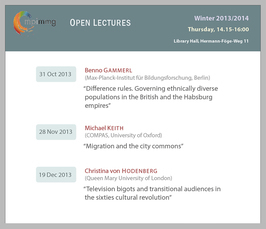"Migration and the city commons"
Open Lectures Winter 2013/14
- Date: Nov 28, 2013
- Time: 02:15 PM - 04:00 PM (Local Time Germany)
- Speaker: Michael Keith (COMPAS, University of Oxford)
- Michael Keith is Director of the Centre on Migration, Policy and Society (COMPAS), Co-Director of the Oxford Programme for the Future of Cities http://www.futureofcities.ox.ac.uk/ and holds a personal chair in the Department of Anthropology at the University of Oxford. He is the author of ten books on issues of urban change, race, ethnicity and migration including – most recently – ’China Constructing Capitalism: Economic Life and Urban Change’.
- Location: MPI-MMG, Hermann-Föge-Weg 11, Göttingen
- Room: Library Hall

For more details please contact buethe(at)mmg.mpg.de.
When we invoke the notion of the right to the city what do we mean in a long-established metropolis such as London or the emergent mega cities of India, China and the global south? How do we make sense of the complex entanglement of migration-driven demographics and urban change?
Harvard economist Ed Glaeser has claimed that cities unlock the dynamics of social and economic change through the beneficial positive externalities of urbanism’s density of people and institutions (Glaeser 2011). From a different disciplinary, theoretical and political trajectory, former Multitudes Editor Yann Moulier-Boutang has similarly argued that the positive externalities and spillovers of the networks of the city drive economic change in the cognitive capitalism of the 21st century. But how do we conceptualise these concentration effects of urban change? From a position closer to Moullier-Boutang than Glaeser, Ash Amin and Nigel Thrift have argued that a sense of the commons is central to a metropolitan ethics (Amin and Thrift 2002; Amin 2010). But what does it mean to take seriously the notion that the city exemplifies a form of commons? And how should we consider the governance of the commons, translate the ‘right to the city’ into a meaningful language of ethical dilemmas and policy intervention? Nowhere are these questions more pressing than in the case of the stranger and the new arrival in the city. As cities grow exponentially and dominate the ways of life in Europe and North America as well as the global south, the metropolis of the migrant challenges the social order, raises questions about both obligations and entitlements as well as about the connection between built form social networks, cultural formation and material objects. In this talk, Keith draws on recent work in London and China to explore what it might mean to start from the position that the city represents – at least in some sense – a formation of the commons.